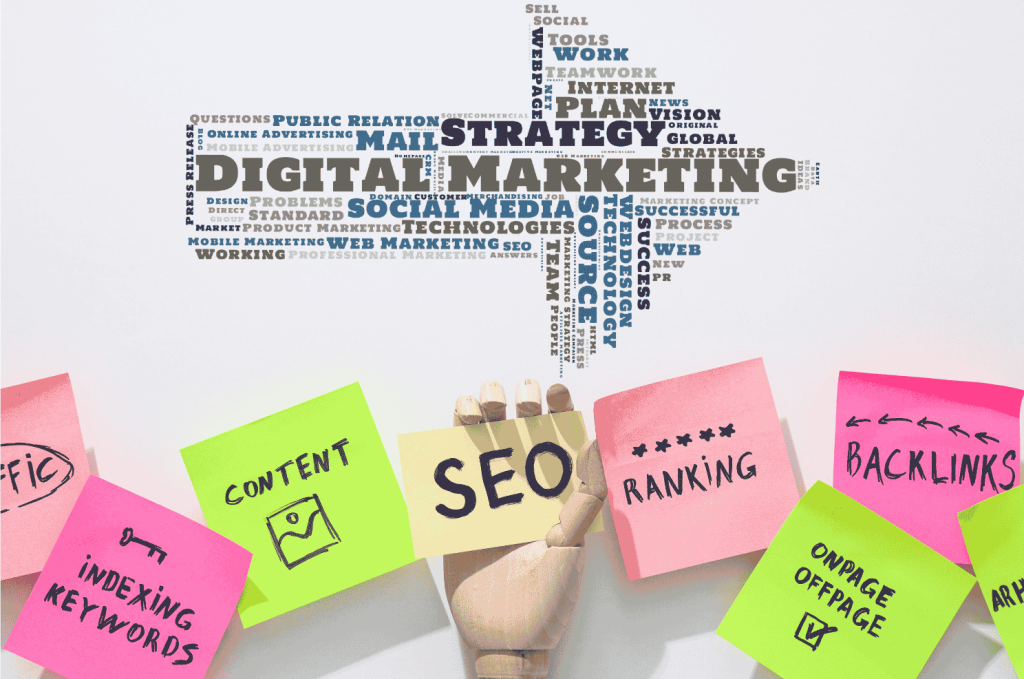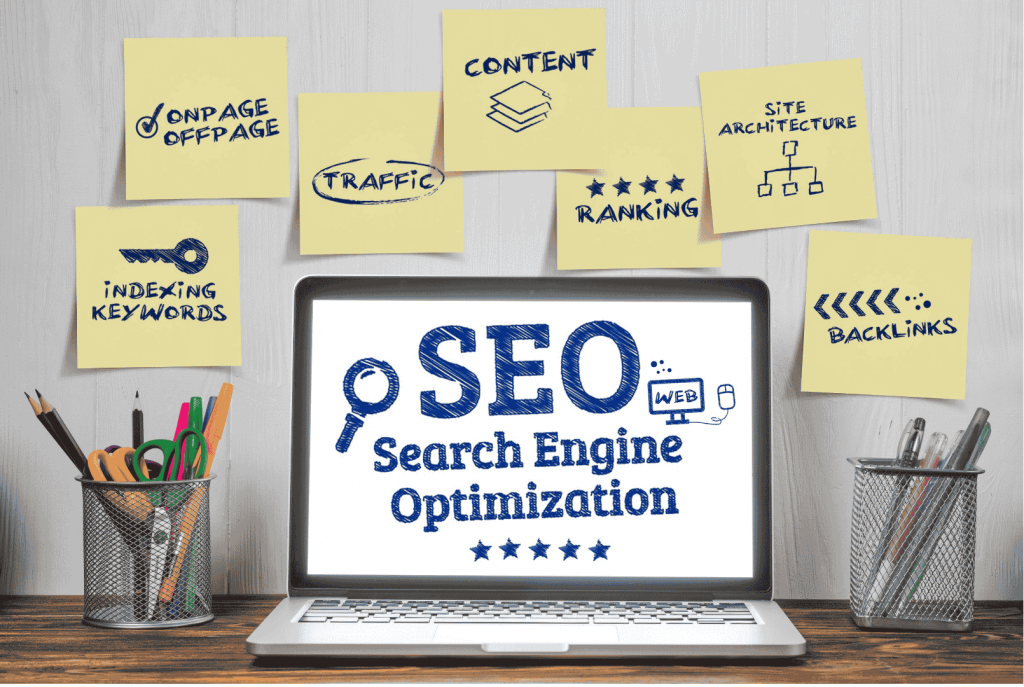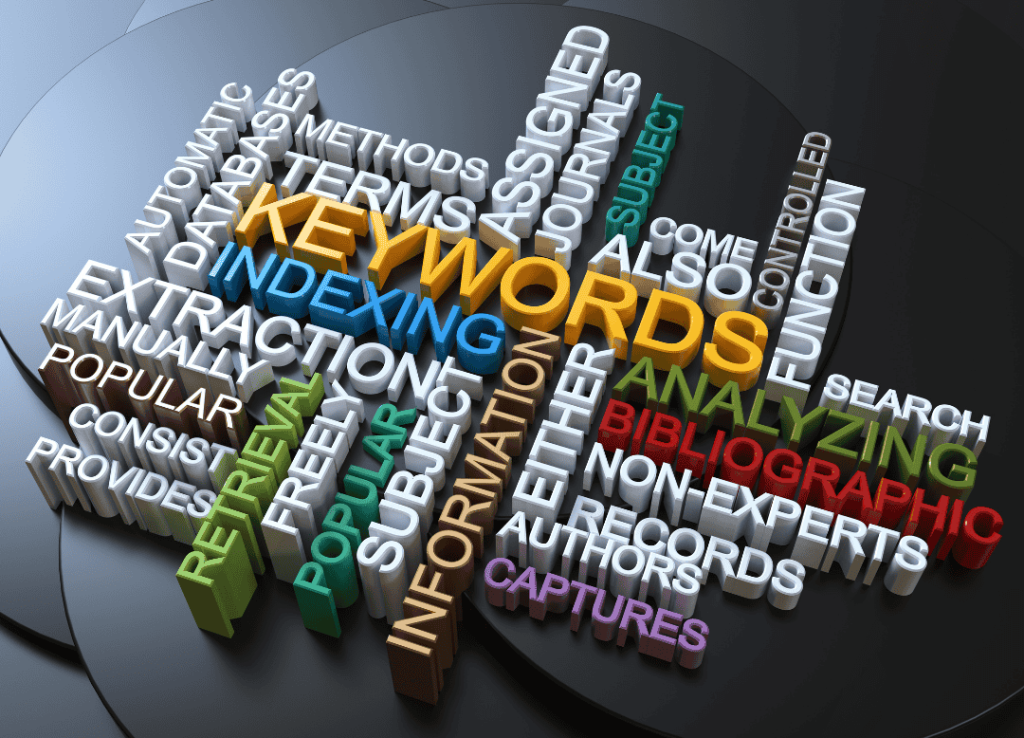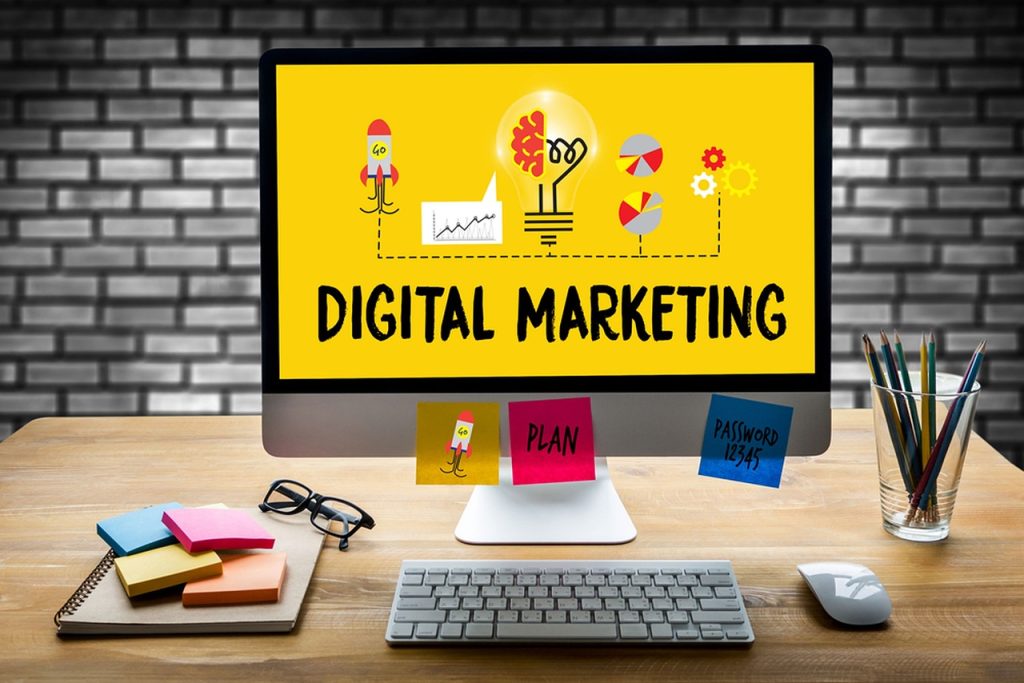Hey there, my lovely readers. Today, I’m introducing you to the hot topic of digital marketing which is SEO. Here, I’m going to provide you with everything you need to know about it as a beginner and get a better understanding with digital marketing.
In this blog you’ll find answers to questions like what is SEO in digital marketing, its importance, types and role in digital marketing. So, if you’re someone who is curious about all of this, stick with me through the end.
Introduction
If you are someone interest in digital marketing, you may had heard one term that frequently stands out- SEO, or Search Engine Optimization. (if never, then here I’m introducing it to you.) Have you ever wondered how some websites always appear at the top of search engine results while others seem to get lost in the crowd, or why the top appearing site is in the top- the answer lies in their strategies.
It is a crucial part of digital marketing because it helps businesses connect with their audience by improving online visibility and driving organic traffic. SEO in digital marketing is not just about getting clicks; it’s about delivering value to users who are actively searching for solutions.
This will be your guide to SEO. Whether you’re a beginner or looking to refresh your knowledge, this will help you understand it’s role in transforming digital strategies. So, let’s start with defining.
What is SEO?
SEO [Search Engine Optimization] is the practice of optimizing a website to rank higher in search engine results pages [SERPs] organically- that is, without paid ads. (which is really not that easy) The primary objective of it, is to make your website more visible to people searching for keywords or topics related to your business.
In simpler term, it is optimizing the site to make its rank on top in SERP without spending any money. And when we say search engines, it doesn’t mean only Google, but all the topmost search engines like Firefox, Bing, etc.
Search engines like Google use algorithms to determine which pages to show for a given search query. These algorithms evaluate a wide range of factors, such as:
- How relevant your content is to the search query.
- The quality and credibility of your website.
- The user experience offered by your site [e.g., speed, mobile-friendliness].
It helps bridge the gap between what users are searching for and the information, products, or services your website offers. It’s a way to ensure your site is not just found but is also trusted by both search engines and users. (now that you’ve found my site, my site’s optimization seems to be successful)
To explain you with an example, SEO is like setting up a well-organized shop on a busy street. The more attractive, trustworthy, and easy-to-navigate the shop is, the more likely people are to stop by- and search engines reward that effort by boosting your rankings.
Why is SEO Important in Digital Marketing?

It is most than just a buzzword in the digital marketing world- it’s a necessity. Here’s why:
1. Increases Visibility and Organic Traffic
- In digital marketing, visibility is everything. When your website ranks higher on search engine results pages (SERPs), more people can find your business organically.
- It is a cost-effective way to attract potential customers to your site as unlike paid ads, organic traffic driven by SEO doesn’t cost per click.
- A strong strategy ensures your website appears where your target audience is searching.
2. Build Trust and Credibility
- People trust search engines, that is why everything is searched every time.
- When your website ranks on the first page of Google or Bing, users perceive your business as more credible and trustworthy. (I think this is what you feel too when searching something)
- It helps establish this credibility by optimizing your content and improving user experience, signaling to both search engines and visitors that the site is valuable and reliable.
3. Enhance User Experience (UX)
- When we talk about SEO in digital marketing the first thing related to it comes in mind is keywords; but it isn’t just about keywords. Rather it’s about creating a better experience for your audience.
- A well-optimized site is fast, mobile-friendly, and easy to navigate- all factors that keep users engaged.
- Positive user experience leads to higher engagement, lower bounce rate, and increased conversions- all the crucial metrics in digital marketing. (I’ll talk about these in different post. So stay tuned.)
4. Boosts ROI [Return on Investment]
- As already told, SEO in digital marketing means ranking the site organically, meaning compared to traditional advertising, it is cost-effective and delivers measurable results over time.
- Investing in it ensures long-term benefits, as organic traffic continues to grow without the recurring cost of paid campaigns.
- Digital marketers often find that organic-driven traffic converts better, providing higher ROI for their efforts. (isn’t it interesting?)
5. Helps Stay Ahead of Competitors
- In today’s competitive market, if your website isn’t optimized, without saying much, you’re likely losing out to competitors who are ranking higher.
- A strong strategy can give you the edge by ensuring your content appears first when potential customers search for solutions you offer.
6. Complements Other Digital Marketing Efforts
- It works hand-in-hand with other digital marketing strategies like content marketing, social media, and PPC campaigns.
- For instance, great content won’t perform well if users can’t find it. SEO in digital marketing ensures your content gets the attention it deserves by making it discoverable in search engines.
In short, it is the foundation of any successful digital marketing strategy. By optimizing your website and content, you attract quality traffic, build trust, and set the stage for long-term business success. Without this, you are lost in the crowd, giving opportunity to your competitors.
Now that you know the importance of SEO in digital marketing. Let’s talk about its key components.
The Key Components
It isn’t just about adding keywords to your website; it’s a multi-sided approach that involves several key elements which work together to improve your site’s visibility and performance. Some of the essential components that make it effective:
1. On-Page SEO
This focuses on optimizing the elements within your website (like your blog post or website content) to make it more search-engine-friendly. Key aspects of on-page include:
- Keywords: Keywords are the words and phrases that people type into search engines when they’re looking for information. Researching an using relevant keywords in your content, headings, and meta tags to match users are searching for. (I’ll dive deep in this on my other article, so stay tuned to my blog.)
- High-Quality Content: Creating valuable, engaging and informative content tailored to your target audience. Search engine prioritize content that answers user questions effectively.
- Meta Tags: Writing strong and effective title tags and meta descriptions that encourage clicks while including your target keywords.
- Internal linking: Connecting pages within your site to improve navigation and search engines understand your site structure.
2. Off-Page SEO
This involves activities outside your website that increase its reputation and authority in the eyes of search engines. Here includes:
- Backlinks: It means getting high-quality backlinks from reputable websites, which signal to search engines that your content is valuable and trustworthy.
- Social Signals: Building engagement through social media platforms to drive traffic and increase your brand’s online presence.
- Guest Blogging: This includes writing articles for other websites to earn backlinks and reach a broader audience.
3. Technical SEO
As the word suggests, this ensures that your website meets the technical requirements of search engines, making it easy for them to crawl, index, and rank your site. (don’t feel overwhelming about these terms, I’ll explain these on my other posts or you can just google it, right?) Important aspects include:
- Site Speed: It means optimizing your website’s load time to ensure a smooth user experience. Search engines prioritize fast-loading sites.
- Mobile-Friendliness: Making sure your site is responsive and functions well on mobile devices, as if your site doesn’t work properly on mobile, it will affect your ranking factor.
- URL Structure: Creating clean, descriptive, and easy-to-read URLs for better user and search engine understanding.
- Sitemaps: It includes providing a roadmap for search engines to navigate your site efficiently.
4. Local SEO
This one is really important for businesses that target local audience. This includes:
- Google My Business Optimization: This includes putting your business on Google My Business and optimizing it by ensuring your business information is accurate and up-to-date there.
- Local Keywords: Using location-specific keywords to target nearby customers. For eg: Suppose you’re running a coffee shop in Seattle, Washington. Instead of targeting broad keywords like “best coffee shop” (which is very competitive), you’d focus on local keyword for SEO in digital marketing like: “Best coffee shop in Seattle.”
- Reviews: Encouraging positive reviews on platforms like Google, Yelp and TripAdvisor to boost credibility and rankings.
5. Content Strategy
If you are even a little bit familiar with SEO, you would know content can be said as the heart of it. Regularly publishing high-quality, relevant, and engaging content helps:
- Attract and keep the visitors.
- Build authority in your niche.
- Provide opportunities to rank for a variety of keywords.
6. Analytics and Tracking
It involves monitoring your site’s performance to understand what works and what doesn’t. Tools like Google Analytics and Google Search Console help track:
- Traffic sources
- Keyword rankings
- User behavior
These insights allow you to improve your SEO strategy for better results.
Understanding these key components provides a roadmap for building a strong foundation in digital marketing success. Each of these play an important role in ensuring your website performs well, engages users, and ranks highly in search results.
How does SEO Work?
To put simply, it works like a bridge between your website and search engines helping them understand and rank your content effectively. Think of it as a way to make your website a favourite among search engines like Google.
To give you an example, imagine you’re writing a report for your professor, and make sure it’s neat, clear and has all the answers. SEO in digital marketing works by using special rules, or “guidelines”, that websites follow. Here are some of the key things it does:
- Picking the Right Words: These are called “keywords”. For e.g., if people are searching for “best pizza near me,” and your website talks about pizza, you should use those words in your content.
- Making Websites Easy to Read: You may have experienced yourself, if a website is messy and hard to use, you would leave it immediately. That’s exactly would happen if your website is not clean and easy to use. SEO in digital marketing helps keep things organized so visitors stick around.
- Building Trust: Websites with helpful information and good reviews are trusted more. It includes strategies to make your site reliable.
Search engines also send out “spiders” [tiny virtual robots] to crawl around your website and check if you’re following these rules. If you are, they rank your site higher, making it easier for people to find. To summarize with the above example, it’s like being a star student in class- do your homework, keep things tidy, and help others, and you’ll get noticed.
Benefits of SEO in Digital Marketing

Now let’s talk about the most important stuff i.e., what is the benefit of SEO in digital marketing. Imagine you’ve a lemonade stand, (I know I’m asking you to imagine a lot, but with examples we learn fast and understand better, isn’t it.? So, keep imagining with me.) and you want lots of people to find it and buy lemonade. SEO is like putting up bright signs that guide people to your stand. Here are some of its benefits:
- More Visitors to Your Website: When you optimize, more people can find your site just like a lemonade stand with colourful signs gets more customers.
- Saves Money: Unlike paying for ads, search engine optimization is like free advertising. Once your site ranks high, you don’t need to keep paying to get noticed.
- Builds Trust: When people see your site at the top of search results, they think, “this must be good!” It helps you look reliable.
- Works 24/7: It keeps working even when you’re sleeping. Your website stays visible to anyone searching anytime.
To summarize, it is a magical tool that makes your site popular without spending a fortune. (but remember, it takes a lot of time and efforts. So, don’t feel disappointed if you don’t see the results immediately.)
Challenges of SEO in Digital Marketing
As I’ve said in many of my posts, everything has two sides- good and bad, so if we have benefits of organic optimization, it too has some challenges with it. To understand it, let’ go back to the lemonade stand. (are you feeling to drink lemonade now, don’t know about you but I want to now.)
What if your sign gets lost in a crowd of other signs? You know you will have competitors, whatever your business may about. That’s a challenge, right? Here are some challenges:
- Takes Time: It doesn’t work overnight. It’ like planting a tree that you water it everyday and wait for it to grow big and strong.
- Lots of Competition: You’re not the only one working in it. There are lots of other kids on the street who had a lemonade stand. So to stand out, you’d have to work extra hard.
- Changing Rules: Search engines like Google keep changing their rules, so you have to stay updated, keep learning and adjusting your site accordingly.
- Not Always Predictable: Sometime, even if you follow all the rules, your site might not rank as high as you want. Meaning its really unpredictable, like trying your best on a test but not always getting full marks.
However, I have to say even with these challenges, it is worth it because, with patience and effort, the benefits beat the weight of struggles. Think of it like a game- you face tough levels, but when you win, it feels amazing. (as for me I’m still in tough level, so support me guys, I also want to feel amazing.)
Conclusion
SEO in digital marketing is like a secret recipe that helps your website shine in a crowded online world. It’s not just about ranking higher on search engines but it’s about connecting with the right people, building trust, and creating a long-term success for your brand or business.
Yes, it comes with challenges, like staying updated with changes and being patient for results, but the rewards are worth it with more visibility, credibility, and the ability to attract the audience . It sure is a powerful tool in digital marketing as it help your website shine with barely spending anything on it. Whether you’re just starting or already running website, learning and using it is a game-changer.
It is journey of growth that can transform your website and digital marketing strategy. So start now if you haven’t, explore it, stay updated and lead your site to success. Happy learning! And stay tuned for more.





